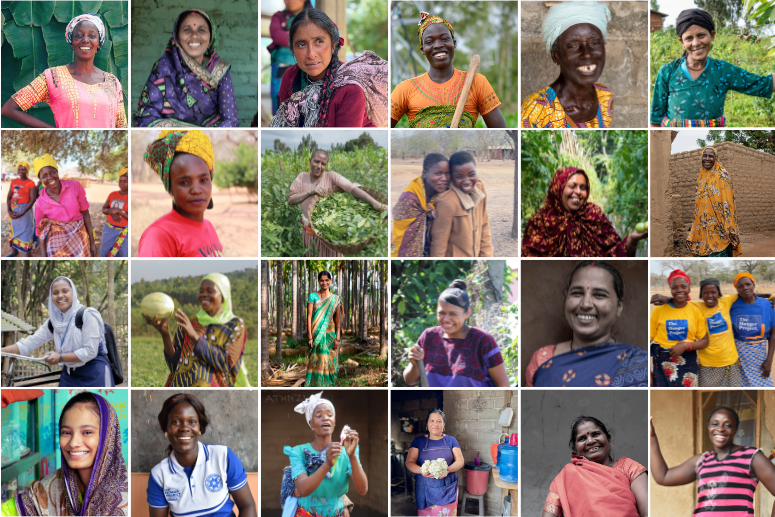Invest in women and accelerate progress toward a world without hunger.
It’s time to transform the systems of inequity that are keeping women under-resourced and over-burdened.
Mobilized women are a driving force behind thriving and resilient communities. But, around the world, women are systematically denied access to education, healthcare and finance. This discrimination creates a cycle of hunger, poverty and gender inequality.
Child and maternal health remains a prevalent issue. Despite efforts, food insecurity disproportionately affects women and people living in rural areas (SOFI 2023). South Asia and sub-Saharan Africa are home to 68 percent of adolescent girls and women who are underweight and 60 percent of adolescent girls and women with anemia (UNICEF 2023)
Across our programs, we address the multifaceted barriers that impede women’s progress. We firmly believe that supporting women to be key change agents—in their communities and beyond—is essential to breaking the cycle of gender inequality and creating a world without hunger. An investment in women is an investment in a more inclusive society where everyone can thrive.
How We Invest in Women.
Fostering thriving communities begins with our first program pillar—Start With Women. Our emphasis on women stems from the belief that empowered women are change agents in their families and communities. Our work elevates and supports women globally to thrive in the following areas:
Investing in Maternal and Child Nutrition
Proper nutrition plays a critical role in building healthier communities that can step into their full potential. Across Africa, South Asia and Latin America, we train community leaders with strategies to combat maternal and child malnutrition through cooking workshops, education and support groups and supplemention with micronutrients when necessary.
The Right2Grow program aims to reduce malnutrition in children under the age of 5. In 40 Union Parishads in Bangladesh (reaching more than 165,000 people), we organize maternal health meetings where animators monitor the weight and growth of young children. They use this data to draft growth curve graphs. That visual translation supports conversations with mothers (to be) about the importance of healthy nutrition. And with this data, these mothers and their fellow community members can successfully pressure their local government to increase budgets for WASH and nutrition. To date, annual budgets of 21 Union Parishads increased by 2,6% resulting in improved access to WASH and nutrition, and better mother and child care.
Additionally, we tap into Indigenous knowledge on food systems to improve nutrition. Our work in Mexico actively engages with local leaders, preserving Indigenous knowledge and promoting nutrient-rich local crops and traditional recipes. By celebrating cultural heritage and food traditions, we echo the global imperative of investing in maternal and child nutrition, paving the way for healthier, vibrant communities worldwide.
Strengthening Women’s Leadership
Across all our programs, we work with women to elevate themselves as leaders in their communities. In India, we invest in building and strengthening leadership skills and capacities of elected women and encouraging active citizenship amongst adolescent girls. Our initiatives focus on mobilizing, organizing, educating and raising awareness on the whole.
Elevating Women-Owned Business
To create a world without hunger, we are committed to strengthening community-level entrepreneurship, cooperatives and purpose-driven partnerships with local, regional, national and international private sector actors.
In Burkina Faso, 15 community banks across epicenters are providing women loans for income-generating activities. Additionally, our partners are leading training in financial literacy and business management skills, enabling women to take charge of their lives and unlock their capacity for change.
In Uganda, women leaders from the Butambala district are initiating innovative projects by forming savings groups and an economic ecosystem for women to support one another. Read Aisha’s story to learn more about how savings groups are elevating women-own businesses.
Achieving Self-Reliance
Across our programs in Africa, our Epicenter Strategy collaborates with empowered communities to take the reins of their own development. Through integrated and holistic approaches, we achieve synergy among programs in health, education, water and sanitation, adult literacy, nutrition, improved farming, food security and microfinance.
How You Can Invest In Women.
At The Hunger Project, we believe that investing in women is not just a strategic choice but an imperative. Together, we can create sustainable change and mobilize women to overcome challenges, realizing their full potential as leaders and contributors to their communities.
To effect change in the global systems keeping hunger in place, we need to embrace radical, gender-responsive, transformative approaches. We need to increase investment in gender-conscious interventions and change legal and policy frameworks at both local and national levels. Without these long-term systems changes that leverage the unique abilities and perspectives of those living in hunger and poverty, the gender inequality gap will continue to widen, leaving women — and our entire planet — in vulnerable positions during future global crises.

